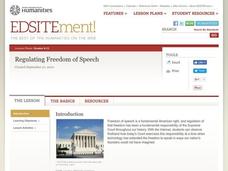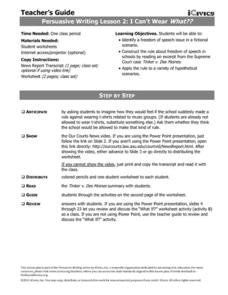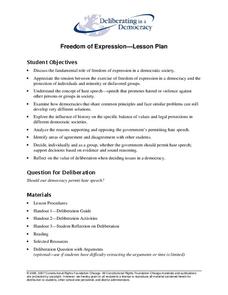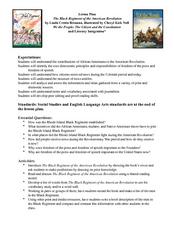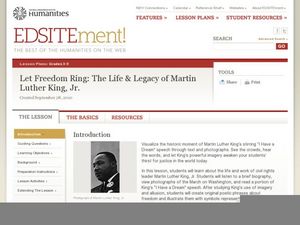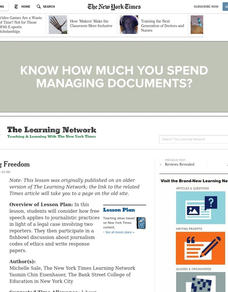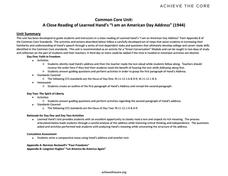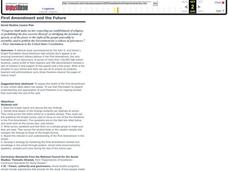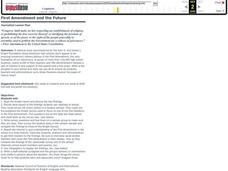Curated OER
Regulating Freedom of Speech
Young scholars examine the nature and limits of the Constitutional right to freedom of speech. They read and analyze the First Amendment, discuss various case studies, and research and record their own opinion on discussion questions.
Curated OER
From Tinker to Fraser: Freedom of Speech in Public Schools
The Tinker and Fraser cases were taken the Supreme Court on the basis of the 1st Amendment right to Freedom of Speech. Learners discuss each case, the First AMendment, complete handouts, and conduct a role play activity. Handouts are...
Curated OER
The First (and Last) Words
What does "freedom of speech" mean to your class, especially in the context of Internet communications? In round-table discussion format, middle and high schoolers address the issues discussed in "State Legislatures Across U.S. Plan to...
Curated OER
Political statements and protected speech
Students research and investigate what laws exist about freedom of speech. They write an article about this topic. Students interview the students at their school on this topic. They take a stand and support their stand with facts.
iCivics
I Can’t Wear What?
Can schools ban t-shirts picturing musical groups or bands? Your young citizens will find out with this resource, which includes a summary of a United States Supreme Court case from the 1960s about a similar dispute over students wearing...
Media Smarts
You Be the Editor
Look at different case studies to discuss the ethics of journalism. Twelve real-life events are written up and your learners get to be the editors. Encourage your class to think about the implications of publishing decisions. After each...
Deliberating in a Democracy
Freedom of Expression
Should democracies include hate speech as a protected right? Scholars analyze the rights found under the First Amendment to the Constitution through researching evidence. Freedom of expression becomes the focal point of the...
State Bar of Texas
Schenck v. US
Freedom of speech is absolute—or is it? The Supreme Court case Schenck v. United States has learners research what free speech really looks like. A short video along with paired work creates open discussion and thought on what speech is...
Benjamin Franklin Tercentenary
Reading the Work of B. Franklin, Printer
Placing Ben Franklin’s ideas about a free press next to those embodied in the First Amendment sheds light on both. Learners interpret and compare two primary sources and then examine them in the light of a contemporary survey about...
Constitutional Rights Foundation
Why We Have Freedom of the Press
A newspaper receives documents that reveal not only a devastating secret the public needs to know, but also troop movements that could put American lives at risk: to publish or not to publish? Using background readings, discussion...
Curated OER
Writing a Newspaper Article
The perfect resource for a beginning journalism teacher or someone designing a journalism unit, this activity prompts learners to write a newspaper article. It covers all aspects of the writing process, such as a guided warm-up...
Curated OER
We the People: The Citizen and the Constitution: The American Revolution
The contributions of African-Americans to the American Revolution are the focus of this Social Studies and language arts activity. After reading and discussing Linda Crotta Brennan’s The Black Regiment of the American Revolution, class...
Curated OER
Let Freedom Ring: The Life & Legacy of Martin Luther King, Jr.
Students use text and photos to visualize the delivery of Dr. Martin Luther King, Jr.'s historic "I Have A Dream" speech. They analyze Dr. King's speech for examples of imagery and allusion and create original poetry and illustrations...
Newseum
Battle for the Bill of Rights: Ultimate Survivor Amendment Game
To understand the importance of the wording of the articles of the First Amendment (freedom of religion, freedom of speech and the press, and freedom to assembly and petition), teams argue before a jury for draft amendments of one...
Curated OER
Texas v. Johnson
Students examine the freedom of speech. For this Supreme Court lesson, students analyze primary documents from Texas v. Johnson and discuss the implications of the decision regarding flag burning.
Curated OER
Press-ing Freedom
Learners consider how free speech applies to journalistic practices in light of a legal case involving two reporters. They participate in a fishbowl discussion about journalism codes of ethics and write response papers.
Curated OER
Rights And Responsibilities: Debating Free Speech, Responsibility And Censorship on Campus
Young scholars weigh rights of students and others to free speech versus the responsibilities that come with those rights.
Curated OER
I Am a Book
Third graders discuss books that have been banned and the things that they have in common. They explore the concept of freedom of speech and write poems based on their discussion.
Heritage Foundation
Substantive Amendments: Amendments I and II
The First and Second Amendments remain some of the most famous, even to this day. Learners read about several clauses from the US Constitution through a variety of captivating activities including before and after reading, group work,...
Curated OER
The Four Freedoms
Students discuss the four freedoms. In this freedom activity, students discuss freedom of speech, freedom to worship any God, freedom from want, and freedom from fear. They create a picture to match each freedom and make a book shaped...
Curated OER
A Close Reading of Learned Hand's "I Am an American Day"
Judge Learned Hand's "Spirit of Liberty" speech delivered during the July, 1944 "I Am an American Day" celebration is the subject of a close reading activity that models for learners how to approach a dense, difficult text.
Curated OER
Taking to the Airwaves
Learners consider the purpose of talk radio and examine its importance in the new democratic Iraq. They enact mock talk shows based on current events and reflect on the value of free speech and the role audience members play in radio...
Curated OER
First Amendment and the Future
Students develop a strategy for furthering the First Amendment interest and knowledge in the school through posters, school-wide announcements, speakers, contests and more during the rest of the school year. Student research about free...
Curated OER
First Amendment and the Future
Students read the Knight report and discuss key findings before deciding what aspects of the findings students can replicate in their own school and conduct a survey. They write survey questions and test them on sample group before...
